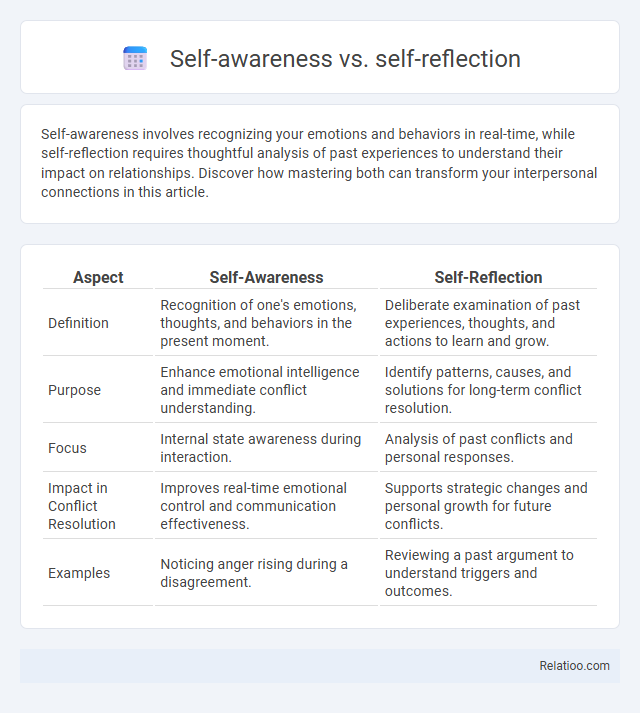Self-awareness involves recognizing your emotions and behaviors in real-time, while self-reflection requires thoughtful analysis of past experiences to understand their impact on relationships. Discover how mastering both can transform your interpersonal connections in this article.
Table of Comparison
| Aspect | Self-Awareness | Self-Reflection |
|---|---|---|
| Definition | Recognition of one's emotions, thoughts, and behaviors in the present moment. | Deliberate examination of past experiences, thoughts, and actions to learn and grow. |
| Purpose | Enhance emotional intelligence and immediate conflict understanding. | Identify patterns, causes, and solutions for long-term conflict resolution. |
| Focus | Internal state awareness during interaction. | Analysis of past conflicts and personal responses. |
| Impact in Conflict Resolution | Improves real-time emotional control and communication effectiveness. | Supports strategic changes and personal growth for future conflicts. |
| Examples | Noticing anger rising during a disagreement. | Reviewing a past argument to understand triggers and outcomes. |
Introduction to Self-Awareness and Self-Reflection
Self-awareness involves recognizing your own emotions, thoughts, and behaviors to understand how they influence your actions and decisions. Self-reflection is the active process of examining your experiences and responses to gain deeper insights and foster personal growth. Understanding these concepts helps you develop emotional intelligence and improve decision-making in various aspects of life.
Defining Self-Awareness: Knowing Yourself
Self-awareness involves accurately recognizing your thoughts, emotions, and behaviors to understand how they influence your actions and interactions. Self-reflection is the deliberate process of examining your experiences and reactions to gain deeper insights and foster personal growth. Defining self-awareness centers on knowing yourself deeply, encompassing your strengths, weaknesses, values, and motivations to enhance decision-making and emotional intelligence.
Understanding Self-Reflection: Analyzing Your Thoughts
Self-awareness involves recognizing your emotions and behaviors in the moment, while self-reflection requires a deeper analysis of your thoughts and experiences over time to foster personal growth. Understanding self-reflection helps you critically examine your beliefs, motivations, and actions to uncover patterns that influence decision-making and emotional responses. Developing this skill enhances your ability to make conscious changes that align with your values and goals.
Key Differences Between Self-Awareness and Self-Reflection
Self-awareness involves recognizing your emotions, thoughts, and behaviors in the present moment, while self-reflection requires actively analyzing and evaluating your experiences to gain deeper insight. The key difference lies in self-awareness providing immediate understanding of your internal state, whereas self-reflection encourages thoughtful examination and learning from past actions. You can enhance personal growth by cultivating both, as self-awareness anchors you in the now and self-reflection guides improvement over time.
The Importance of Self-Awareness in Personal Growth
Self-awareness is a foundational component of personal growth, enabling you to understand your emotions, thoughts, and behaviors with clarity. Unlike self-reflection, which involves analyzing past experiences, self-awareness emphasizes real-time recognition of your internal states, fostering emotional intelligence and better decision-making. Developing self-awareness creates a pathway for continuous improvement, increased resilience, and authentic relationships by aligning your actions with your core values and goals.
The Role of Self-Reflection in Emotional Intelligence
Self-reflection plays a critical role in emotional intelligence by enabling individuals to examine their emotions and behaviors, which enhances self-awareness and promotes emotional regulation. Unlike basic self-awareness, which involves recognizing emotions in real-time, self-reflection allows for deeper analysis and understanding of underlying feelings and motives. This process strengthens emotional intelligence by fostering empathy, improving decision-making, and supporting personal growth.
How Self-Awareness and Self-Reflection Work Together
Self-awareness involves recognizing one's emotions, thoughts, and behaviors in real time, while self-reflection is the deliberate process of examining those experiences to gain deeper insights. Together, they create a dynamic feedback loop where self-awareness provides raw data for self-reflection, enabling personal growth and improved decision-making. This synergy enhances emotional intelligence by fostering continuous learning and adaptation through mindful evaluation of one's inner state.
Practical Techniques to Enhance Self-Awareness
Self-awareness involves recognizing your thoughts, emotions, and behaviors, while self-reflection is the intentional process of examining those elements to gain deeper understanding. Practical techniques to enhance self-awareness include journaling your daily experiences, practicing mindfulness meditation to observe your mental state, and seeking feedback from others to uncover blind spots in your perception. By integrating these methods consistently, you empower your ability to make conscious decisions and foster personal growth.
Strategies for Developing Effective Self-Reflection
Effective self-reflection strategies involve setting aside dedicated time for introspection, journaling thoughts and emotions, and seeking feedback from trusted sources to enhance self-awareness. Utilizing mindfulness techniques and asking targeted questions about personal values, behaviors, and goals deepen understanding of oneself. Integrating these practices cultivates improved decision-making, emotional regulation, and continuous personal growth.
Choosing the Right Approach: When to Use Self-Awareness vs Self-Reflection
Self-awareness involves recognizing one's emotions, thoughts, and behaviors in real-time, serving as a foundational skill for emotional intelligence and personal growth. Self-reflection requires a deliberate and structured review of past experiences, enabling deeper understanding and learning from specific situations or decisions. Choosing the right approach depends on immediate needs: use self-awareness to monitor present states for quick adjustments, and self-reflection for comprehensive analysis that informs future actions and long-term development.

Infographic: Self-awareness vs Self-reflection
 relatioo.com
relatioo.com